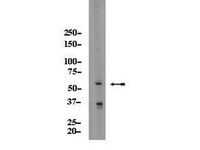Gene dosage--limiting role of Aire in thymic expression, clonal deletion, and organ-specific autoimmunity.
Liston, Adrian, et al.
J. Exp. Med., 200: 1015-26 (2004)
2004
Zobrazit abstrakt
Inactivation of the autoimmune regulator (Aire) gene causes a rare recessive disorder, autoimmune polyendocrine syndrome 1 (APS1), but it is not known if Aire-dependent tolerance mechanisms are susceptible to the quantitative genetic changes thought to underlie more common autoimmune diseases. In mice with a targeted mutation, complete loss of Aire abolished expression of an insulin promoter transgene in thymic epithelium, but had no effect in pancreatic islets or the testes. Loss of one copy of Aire diminished thymic expression of the endogenous insulin gene and the transgene, resulting in a 300% increase in islet-reactive CD4 T cells escaping thymic deletion in T cell receptor transgenic mice, and dramatically increased progression to diabetes. Thymic deletion induced by antigen under control of the thyroglobulin promoter was abolished in Aire homozygotes and less efficient in heterozygotes, providing an explanation for thyroid autoimmunity in APS1. In contrast, Aire deficiency had no effect on thymic deletion to antigen controlled by a systemic H-2K promoter. The sensitivity of Aire-dependent thymic deletion to small reductions in function makes this pathway a prime candidate for more subtle autoimmune quantitative trait loci, and suggests that methods to increase Aire activity would be a potent strategy to lower the incidence of organ-specific autoimmunity. | 15492124
 |
Projection of an immunological self shadow within the thymus by the aire protein.
Anderson, Mark S, et al.
Science, 298: 1395-401 (2002)
2002
Zobrazit abstrakt
Humans expressing a defective form of the transcription factor AIRE (autoimmune regulator) develop multiorgan autoimmune disease. We used aire- deficient mice to test the hypothesis that this transcription factor regulates autoimmunity by promoting the ectopic expression of peripheral tissue- restricted antigens in medullary epithelial cells of the thymus. This hypothesis proved correct. The mutant animals exhibited a defined profile of autoimmune diseases that depended on the absence of aire in stromal cells of the thymus. Aire-deficient thymic medullary epithelial cells showed a specific reduction in ectopic transcription of genes encoding peripheral antigens. These findings highlight the importance of thymically imposed "central" tolerance in controlling autoimmunity. | 12376594
 |















